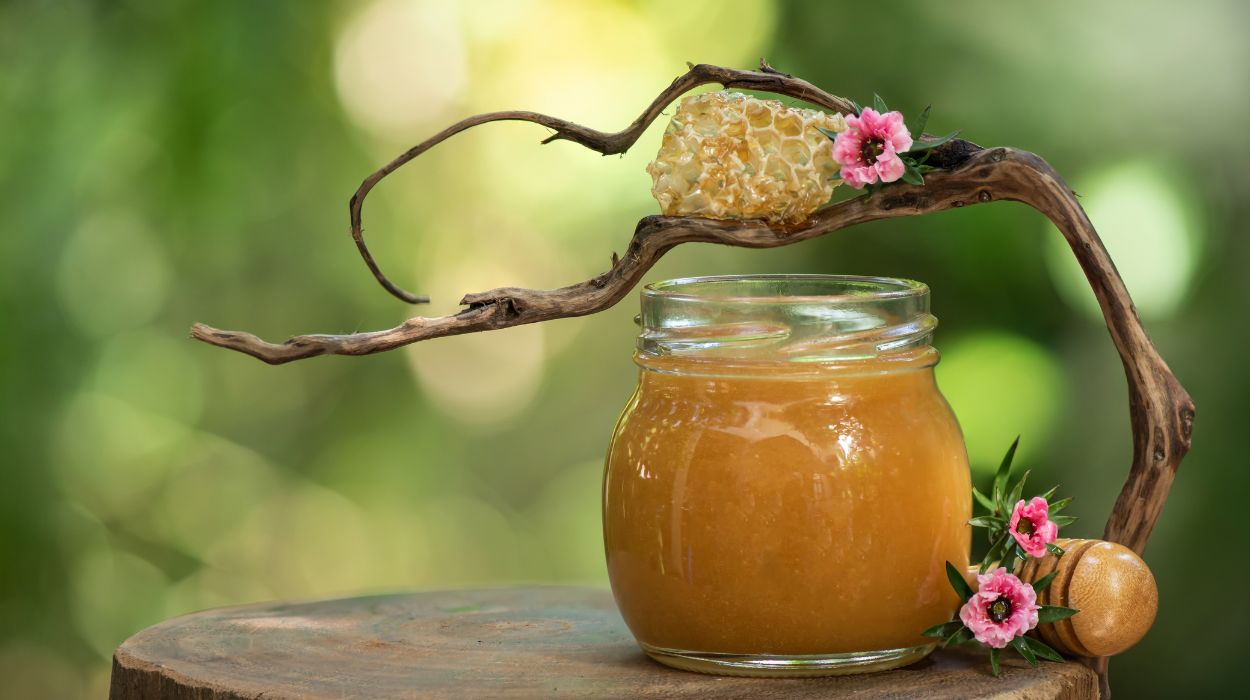 Expert's opinion
Expert's opinion
Expert's opinion
The article is a subjective view on this topic written by writers specializing in medical writing.
It may reflect on a personal journey surrounding struggles with an illness or medical condition, involve product comparisons, diet considerations, or other health-related opinions.
Although the view is entirely that of the writer, it is based on academic experiences and scientific research they have conducted; it is fact-checked by a team of degreed medical experts, and validated by sources attached to the article.
The numbers in parenthesis (1,2,3) will take you to clickable links to related scientific papers.
7 Manuka Honey Benefits: Proven Benefits You Should Know In 2024

It is no secret that honey holds a plethora of health benefits, and manuka honey stands out as one of the most beneficial types. Rich in vitamins, minerals, antioxidants, and enzymes, this natural food has been used since ancient times as a holistic remedy to treat various ailments, from sore throats to stomach ulcers!
But is manuka honey good for you? And what manuka honey benefits make it so unique and sets it apart from regular honey? We will explore all this information in depth below and explain how you can use manuka honey to improve your overall health and well-being.
Health Benefits Of Manuka Honey
- Manuka honey contains many more antioxidants than regular honey, helping to combat free radical damage in the body.
- Reduces inflammation in the body, reducing pain and helping to heal wounds[1] such as diabetic foot ulcers.
- Fight harmful bacteria that cause digestive issues. For further help reducing gastrointestinal issues, you may want to consider taking digestive enzymes.
- Reduces bad cholesterol in the body while helping to increase good cholesterol.
- Improves the immune system by fighting off free radicals.
- Gives energy and increases athletic performance.
- Helps heal wounds when applied topically.
Manuka Honey Benefits: Amazing Health Uses Of It
Rich In Antioxidants
Manuka honey contains a much higher amount of antioxidants[2] than regular honey. It contains polyphenols, which are potent antioxidants known for their ability to reduce oxidative stress and protect cells from damage.
Manuka’s antioxidant properties have far-reaching benefits for the human body. They play a role in preventing illnesses and diseases and can help reduce the effects of aging by neutralizing free radicals. By providing protection from harmful toxins and pollutants, antioxidants can help keep us healthy both inside and out.
Natural Anti-inflammatory Properties
Manuka honey also contains anti-inflammatory properties[3] that can help reduce inflammation in the body, and soothe the pain of a sore throat or from chronic conditions such as arthritis while supporting the body’s natural healing process. Additionally, applying manuka honey topically to wounds is a safe and effective treatment[4] for reducing inflammation and promoting healing time.
Improves Digestive Health
Research shows[5] that consuming real manuka honey regularly helps to reduce the number of harmful oral bacteria and certain bacteria associated with digestive issues like irritable bowel syndrome and Crohn’s disease. This type of honey has been found to effectively fight off harmful bacterial infections such as E. coli and Helicobacter pylori, which are both known to cause digestive issues such as gastric ulcers.
May Help Reduce Cholesterol Levels
Regular consumption of honey can help reduce harmful[6] low-density lipoprotein cholesterol levels (the bad cholesterol) while increasing beneficial high-density lipoprotein cholesterol levels. The unique makeup of manuka honey makes it more effective than regular honey for lowering cholesterol levels. It helps the body naturally break down fats and cholesterol so they don’t become deposited in arterial walls or accumulate in the bloodstream.
Manuka’s antioxidant properties can help keep arteries healthy, reducing cardiovascular disease risk.
Supports Immune System Function And Energy Levels
The antioxidant content within manuka honey helps support immune system function by fighting off free radicals that can lead to premature aging and various illnesses.
Natural Source Of Energy
Manuka honey is not only loaded with vitamins and minerals, but it is also a great source of energy for those looking for sustained vitality without the sugar crash. Research has found[7] that eating honey before physical activity can help improve athletic performance due to its release of carbohydrates into the bloodstream over time.
Promotes Wound Healing
Applying manuka Honey topically has wound-healing properties. It accelerates wound healing time[8] thanks to its anti-bacterial and anti-inflammatory properties. It helps reduce scarring[9] while simultaneously decreasing wound pain since it draws moisture away from these areas while creating an environment hostile to bacterial growth.
What Is Manuka Honey?

Manuka honey is a type of honey harvested predominantly in New Zealand. It is produced by bees that pollinate the manuka bush and manuka flowers native to the region. The main difference between manuka honey and regular honey is the flowers it’s made from and its extra potent antibacterial activity.
Not all honey is created equal. Manuka honey has been used for hundreds of years as both food and medicine due to its unique nutritional profile. Unlike regular honey, manuka honey is[10] rich in active enzymes, minerals, amino acids, and vitamins and has what is called a non-peroxide[11] healing ability. It is this antibacterial healing ability that sets it apart from regular honey.
The extraordinary health claims and properties of manuka honey are also attributed to its high methylglyoxal content.[12] Methylglyoxal gives manuka its distinctive flavor and is responsible for its antibacterial properties.
Research suggests that manuka can relieve allergies, digestive issues, upper respiratory infections, and skin ailments such as eczema and psoriasis.[13] Due to its antiseptic qualities, it can also be used topically to speed up the healing of cuts and treat wounds and burns. Its immune-boosting properties[14] also make it an excellent choice as a natural remedy for cold and flu symptoms.
Manuka Honey Nutrition Facts
Serving Size: 1 Tablespoon (20 grams)*[15]
- Calories: 60 kilocalories
- Total Fat: 0 grams
- Cholesterol: 0 milligrams
- Sodium: 0 milligrams
- Total Carbohydrates: 17 grams
- Dietary Fiber: 0 grams
- Sugars: 16 grams
- Protein: 1 gram
*These values may vary among brands.
One tablespoon of manuka honey provides 60 calories of sugar, though it has not been shown to contribute to weight gain. Manuka honey is a good source of bioactive compounds such as phenols, peptides, and flavonoids, which have been linked to many potential health benefits.
Are There Any Side Effects?
Medical-grade honey is a powerful natural remedy; however, it has potential side effects. Common side effects include nausea, dizziness, and headaches if taken in large doses.
An allergic reaction is possible, as with any food product, and it can cause skin rashes or itching when applied topically to sensitive skin areas.
How To Eat Manuka Honey

To get the most benefits from consuming manuka honey, it should be eaten raw, which means that it should not be heated above 115 degrees Fahrenheit. Try to find one with the highest unique manuka factor. You can have a spoonful directly from the jar or add it to smoothies, oatmeal, yogurt, or even tea. If you intend to use manuka honey as an alternative sweetener in baking recipes, only use a minimal amount due to its intensely sweet taste.
Manuka can also be added to savory dishes for a burst of flavor. Additionally, it can also be used as a topping for toast, yogurt, granola, and oatmeal. Manuka honey can provide sweetness without all the empty calories for those looking for a healthier alternative to regular refined sugar-based syrups and jams.
As an ingredient in vinaigrettes or marinades, it can add depth of flavor and great texture, and it also works well in smoothies, as a natural sweetener, or when added to tea.
If you fancy getting fancy, manuka honey is excellent with cheese platters, adding an intriguing layer of sweetness; try drizzling some over blue cheese or goat cheese! You can even enjoy it on its own by spreading it over your favorite crackers or pairing it with freshly cut fruits for dessert.
How To Use Manuka Honey Topically
Before applying medical-grade manuka honey directly onto the skin, it is helpful to cleanse and dry the affected area thoroughly. Several studies[16] have shown that using manuka honey topically may help reduce inflammation, wound size, and healing time when treating minor burns and wounds. The benefits of manuka honey on the face may include improved skin conditions, such as acne reduction, due to its high antibacterial content.
If you want to use manuka honey as a topical solution for wounds,[17] the best way to apply it is by using gauze bandages soaked with manuka honey, left on for thirty minutes, and then removing it.
Manuka can also be mixed with other ingredients, such as essential oils or shea butter, to create a balm for any affected area. For best results when using manuka honey topically, it is important to use raw honey that has not been overly processed or filtered to preserve its potency.
Manuka Honey Benefits For Hair
Manuka honey is rich in vitamins, minerals, and antioxidants, which help to prevent dryness and maintain moisture balance in the scalp. Its antifungal properties help to keep dandruff at bay. This natural remedy is gentle enough to be used multiple times per week and can even be used on color-treated hair without fear of damage.
Manuka honey is a great natural remedy for hair health as it helps to nourish, cleanse, and condition the scalp.
Mix one teaspoon of manuka honey with one cup of warm water. Massage the mixture into your scalp and let it sit for fifteen minutes before rinsing.
Mix manuka honey with a few drops of olive oil or coconut oil for even deeper conditioning. Leave the mixture on your scalp for up to half an hour before rinsing it out with warm water.
Conclusion
Manuka honey is an incredibly beneficial type of honey that offers numerous health benefits and can be utilized to treat various illnesses and ailments.
Manuka honey has a potent ability to fight bacteria and disease-causing pathogens and contains a plethora of antioxidants as well as compounds that reduce inflammation and oxidative stress in the body. It has also been shown to improve wound healing, boost the immune system, and decrease cholesterol levels, all without having to worry about weight gain.
Not only this but manuka honey can be used as a natural sweetener instead of refined sugars or artificial sweeteners. Whether you’re looking for a natural alternative to drugs or antibiotics or something to add to your daily diet for improved overall health and well-being, manuka honey may be just what you need!
+ 17 sources
Health Canal avoids using tertiary references. We have strict sourcing guidelines and rely on peer-reviewed studies, academic researches from medical associations and institutions. To ensure the accuracy of articles in Health Canal, you can read more about the editorial process here
- Joseph Lewis Foster and McNaughton, A. (2020). Honey dressings for diabetic foot ulcers: overview of evidence-based practice for novice researchers. British Journal of Community Nursing, [online] 25(Sup9), pp.S14–S19. doi:https://doi.org/10.12968/bjcn.2020.25.sup9.s14.
- Anand, S., Pang, E., Livanos, G. and Nitin Mantri (2018). Characterization of Physico-Chemical Properties and Antioxidant Capacities of Bioactive Honey Produced from Australian Grown Agastache rugosa and its Correlation with Colour and Poly-Phenol Content. Molecules, [online] 23(1), pp.108–108. doi:https://doi.org/10.3390/molecules23010108.
- Yazan Ranneh, Abdah Md Akim, Hasiah Ab. Hamid, Huzwah Khazaai, Fadel, A., Zainul Amiruddin Zakaria, Albujja, M. and Mohd (2021). Honey and its nutritional and anti-inflammatory value. BMC Complementary Medicine and Therapies, [online] 21(1). doi:https://doi.org/10.1186/s12906-020-03170-5.
- Kapoor, N. and Yadav, R. (2021). Manuka honey: A promising wound dressing material for the chronic nonhealing discharging wounds: A retrospective study. National journal of maxillofacial surgery, [online] 12(2), pp.233–233. doi:https://doi.org/10.4103/njms.njms_154_20.
- Schell, K.R., Fernandes, K.E., Shanahan, E., Wilson, I., Blair, S.E., Carter, D.A. and Cokcetin, N.N. (2022). The Potential of Honey as a Prebiotic Food to Re-engineer the Gut Microbiome Toward a Healthy State. Frontiers in Nutrition, [online] 9. doi:https://doi.org/10.3389/fnut.2022.957932.
- Alkhalifah, M.K., Alabduljabbar, K.A. and Alkhenizan, A.H. (2021). Effect of natural honey on lowering lipid profile. Saudi Medical Journal, [online] 42(5), pp.473–480. doi:https://doi.org/10.15537/smj.2021.42.5.20200664.
- Hills, S.P., Mitchell, P., Wells, C. and Russell, M. (2019). Honey Supplementation and Exercise: A Systematic Review. Nutrients, [online] 11(7), pp.1586–1586. doi:https://doi.org/10.3390/nu11071586.
- Hanaa Tashkandi (2021). Honey in wound healing: An updated review. Central European Journal of Biology, [online] 16(1), pp.1091–1100. doi:https://doi.org/10.1515/biol-2021-0084.
- Bernstein, R. (2013). The Scientific Evidence Validating The Use of Honey as a The Scientific Evidence Validating The Use of Honey as a Medicinal Agent Medicinal Agent. The Science Journal of the Lander College of Arts and Sciences The Science Journal of the Lander College of Arts and Sciences, [online] 6(2), pp.1–1. Available at: https://touroscholar.touro.edu/cgi/viewcontent.cgi?article=1129&context=sjlcas.
- Martini, N. (2016). Potion or Poison? Manuka Honey. Journal of primary health care, [online] 8(3), pp.277–277. doi:https://doi.org/10.1071/hc15909.
- Adams, C.J., Boult, C.H., Deadman, B.J., Farr, J.M., Megan N.C. Grainger, Manley-Harris, M. and Snow, M.J. (2008). Isolation by HPLC and characterisation of the bioactive fraction of New Zealand manuka (Leptospermum scoparium) honey. Carbohydrate Research, [online] 343(4), pp.651–659. doi:https://doi.org/10.1016/j.carres.2007.12.011.
- Johnston, M., McBride, M., Divakar Dahiya, Owusu-Apenten, R. and Poonam Singh Nigam (2018). Antibacterial activity of Manuka honey and its components: An overview. AIMS microbiology, [online] 4(4), pp.655–664. doi:https://doi.org/10.3934/microbiol.2018.4.655.
- Girma, A., Seo, W. and She, R.C. (2019). Antibacterial activity of varying UMF-graded Manuka honeys. PLOS ONE, [online] 14(10), pp.e0224495–e0224495. doi:https://doi.org/10.1371/journal.pone.0224495.
- Saeed Samarghandian, Tahereh Farkhondeh and Fariborz Samini (2017). Honey and Health: A Review of Recent Clinical Research. PubMed, [online] 9(2), pp.121–127. doi:https://doi.org/10.4103/0974-8490.204647.
- Usda.gov. (2024). FoodData Central. [online] Available at: https://fdc.nal.usda.gov/fdc-app.html#/food-details/2408653/nutrients [Accessed 26 Feb. 2024].
- Wijesinghe, M., Weatherall, M., Perrin, K. and Beasley, R. (2014). Honey in the treatment of burns: a systematic review and meta-analysis of its efficacy. [online] Nih.gov. Available at: https://www.ncbi.nlm.nih.gov/books/NBK78502/ [Accessed 26 Feb. 2024].
- Simon, A., Traynor, K., Santos, K., Blaser, G., Bode, U. and Molan, P.C. (2009). Medical Honey for Wound Care—Still the ‘Latest Resort’? Evidence-based Complementary and Alternative Medicine, [online] 6(2), pp.165–173. doi:https://doi.org/10.1093/ecam/nem175.



